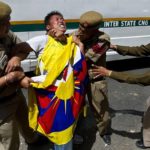India repeatedly undermines the vitality of its democratic example
 The past week brought fresh evidence of just how deeply India abounds in contradiction. On the one hand, New Delhi won international plaudits for standing up for democratic norms in Asia by voting at the United Nations Human Rights Council to investigate alleged war crimes in neighboring Sri Lanka.
The past week brought fresh evidence of just how deeply India abounds in contradiction. On the one hand, New Delhi won international plaudits for standing up for democratic norms in Asia by voting at the United Nations Human Rights Council to investigate alleged war crimes in neighboring Sri Lanka.
Inside its own borders, however, it further tarnished its credentials as a liberal democracy. Eager to avoid discomforting Chinese President Hu Jintao, in town for the annual BRICS (Brazil, Russia, India, China, South Africa) summit, New Delhi invoked a colonial-era law to impose a heavy-handed police lockdown of the Tibetan exile community. Police units sealed off Tibetan neighborhoods in the capital, denying residents the right of assembly and peaceful protest, or even free movement. People elsewhere in New Delhi who even looked Tibetan were harassed by police, an action that the Delhi High Court reprimanded as “racial profiling.”
Adopting the Chinese practice of rounding up dissidents in advance of politically-sensitive dates, Indian police placed over 300 Tibetans in preventive custody, including two Tibetan exiles who were detained while speaking at the Press Club of India. Tenzin Tsundue, an influential Tibetan poet, was forcibly dragged away while addressing a women’s forum. Tsewang Rigzin, an American citizen who serves as president of the Tibetan Youth Congress, was deported the moment he arrived at New Delhi’s international airport.
These measures – instituted after a Tibetan exile, Jamphel Yeshi, set himself ablaze at a large anti-Hu rally held near the Indian parliament – are the latest instance of the country’s timorous commitment to the ideals of free expression. The past year has witnessed other notable examples, including the imbroglio over Salman Rushdie’s abortive appearance at the Jaipur Literary Festival as well as the invective directed at Joseph Lelyveld’s biography of Mahatma Gandhi. The Hindu newspaper called the Rushdie affair “a national shame” and charged that “India has again betrayed its heritage of providing sanctuary to persecuted individuals and ideas, not to speak of its Constitution.”
Add to this the recent efforts by the central government and even the judiciary to censor Internet sites for objectionable content. Ominously, the Delhi High Court judge overseeing a petition to hold Google and Facebook liable for not policing material that might offend religious sensibilities warned that “like China we may be forced to pass orders banning all such websites.”
Indeed, over the last two years, India’s illiberal tendencies have been in particular bloom:
This week’s crackdown also illustrates the dissonance in New Delhi over the increasingly volatile issue of Tibetan nationalism. The true fault line in India-China relations remains the 60 year-old acrimony over the Indo-Tibetan frontier, which is complicated by the sanctuary India gives to the Dalai Lama and the Tibetan government-in-exile which has its seat in the Himalayan town of Dharamsala. The border area was the site for the month-long war between the countries in 1962, as well as serious military crises in 1967 and 1987. It is the only place where the outbreak of armed conflict is a realistic possibility, as well as the focus for much of India’s expansive plans for military modernization.
Over the past six months, the People’s Liberation Army has conducted two major exercises on the vast Qinghai-Tibet plateau that are interpreted in Delhi as deliberate saber-rattling. India’s development of the Agni-V, an intercontinental ballistic missile that will begin flight tests in mid-April, is directed solely at deterring Beijing. A group of Indian foreign policy luminaries recently warned of the possibility of Chinese aggression along the disputed border.
And yet the vigilance on the border is accompanied by political cravenness inside the country. New Delhi continues to be wary of provoking the slightest Chinese displeasure on the Tibet issue. Last December, after Beijing’s protests, Indian President Pratibha Patil and Prime Minister Manmohan Singh cancelled their appearances at an international Buddhist conference in New Delhi that was attended by the Dalai Lama. In November, Indian film censors ordered the deletion of a movie scene displaying the “Free Tibet” flag that was shot in a monastery in Dharamsala. And in 2007, the Singh government instructed its Cabinet ministers to avoid a function organized by the Gandhi Peace Foundation to honor the Dalai Lama.
Moments before poet Tsundue was hauled away by police, he declared that “India gives us our strength, our confidence – India is our guru.” The words neatly encapsulate the soft power strengths the country brings to the competition with an authoritarian China for preeminence in Asia. Yet this week’s events demonstrate how its leaders repeatedly diminish the vitality of India’s democratic example.
I invite you to follow me on Twitter.